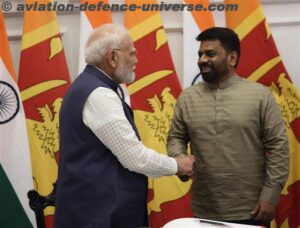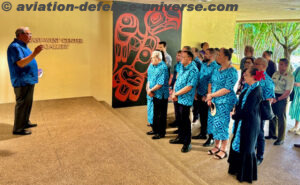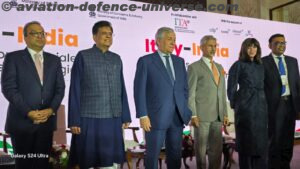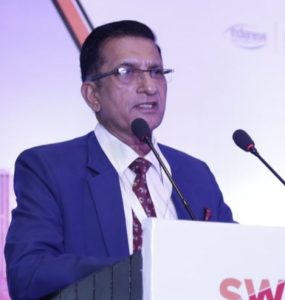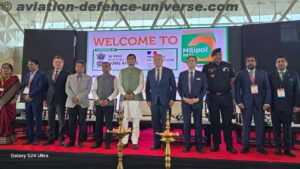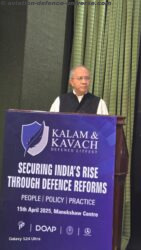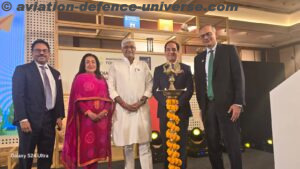- Diplomacy continues under the shadow of Sino-Indian Standoff
- Vice Premier of of China, Wang Yang visited Nepal post BIMSTEC
By JK Verma
New Delhi. 15 August 2017. Sushma Swaraj Indian External Affairs Minister attended 15th meeting of Bay of Bengal Initiative for Multi-Sectoral Technical and Economic Cooperation (BIMSTEC) in Kathmandu on August 10 & 11. This visit became important as armies of India & China are facing a standoff at Doklam, which is a tri-junction of India, Tibet and Bhutan, for more than a month.
It is also significant as this was a few days prior to the visit of Chinese Vice Premier Wang Yang to Nepal to further strengthen ties with the Himalayan Kingdom. Wang who is one of the four Vice Premiers and a member of politburo is visiting Nepal currently to garner its support in the present Doklam standoff. Yang is also contacting leaders of various political parties of Nepal and also exploiting anti-Indian sentiments of Nepalese masses.
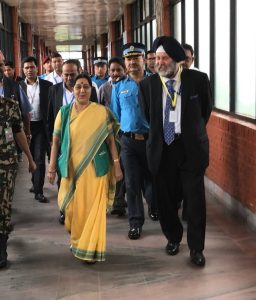
Wang Yang reached directly from Pakistan after taking part in 70th Independence Day celebrations of the country was a ‘special Guest’ in Pakistan. He is accompanied by a high level delegation. He has participated in the inauguration of some projects connected to China-Pakistan Economic Corridor (CPEC) and has signed a few agreements during the visit. The time of Wang’s visit to Pakistan and Nepal is to muster support against India as both India and China are locked in a military standoff from June 16 at Doklam.
Nepal is sandwiched between two Asian giants, India and China hence sometimes it exploits both the nations and sometimes it has to walk on tightrope. After the visits of Swaraj and Wang, Nepalese Prime Minister Sher Bahadue Deuba would be visiting India on a five-day state visit, beginning from August 23. Not only this, Nepalese Deputy Prime Minister and Foreign Minister Krishna Bahadur Mahara also accepted the invitation of Swaraj and would be visiting India soon.
The visiting Indian Foreign Minister met Nepal President Bidhya Devi Bhandari as well as Prime Minister Sher Bahadur Deuba, opposition leader K.P.Oli, Chairman of the Communist Party of Nepal (Maoist-Centre) Pushpa Kamal Dahal Prachanda and others. Beside bi-lateral ties main focus was on the current India- China standoff at Doklam. Swaraj clarified India’s position as well as arrogance of China to subdue India. She also told that by constructing the road China is threatening India’s defence by building road in the disputed territory. Swaraj also explained that China is giving reference of old treaty of 1890 and claims rights on Doklam Plateau but forgets 2012 when it was agreed that tri-junction points would be decided after consultation of all three nations.
On August 11, Mahara stated that Nepal wants a peaceful solution of the current military standoff between India and China at Doklam and it does not “support” any neighbour. He also clarified that Nepal does not want to be “dragged” in the dispute between India and China.
Swaraj also availed the opportunity and met Sri Lankan Foreign Minister Vasantha Senanayake in the margins of BIMSTEC. Analysts claim that Swaraj explained Indian position about Doklam standoff and described Chinese highhandedness and obstinate behaviour.
Swaraj also met Damcho Dorji her Bhutanese counterpart in the sidelines of BIMSTEC at Kathmandu on February 11. Besides discussing several bilateral issues discussion was also held on the current standoff between India and China at Doklam. Both the Foreign ministers clarified the position of their country. Dorji stated after the meeting that Doklam standoff will be sorted out “peacefully”. Bhutan has already issued a statement on August 10 refuting the statement of China that Doklam is not a Bhutanese territory.
BIMSTEC is an important international organisation of South Asia and South Asian countries. Its main aim is to enhance technological and economic cooperation among all the member countries. The Headquarter of BIMSTEC is at Dacca and it includes Bangladesh, India, Myanmar, Sri Lanka, Thailand, Bhutan and Nepal. The importance of BIMSTEC is considerably enhanced as South Asian Association for Regional Cooperation (SAARC) could not function effectively due to non-cooperation of Pakistan.
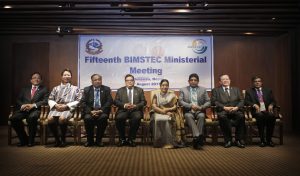
BIMSTEC covers 21 percent of the world population which is roughly 1.5 billion people and the growth rate is about six percent per annum but it suffers from lack of resources and cooperation among member countries.
In the current meeting the foreign ministers of BIMSTEC decided that agreements on customs, services and investments should be implemented soon. Other MOUs and agreements pertaining to technology transfer, trade facilitation, motor vehicles agreement, coastal shipping, legal assistance in criminal matters including organised crime and drug trafficking should also be implemented in letter and spirit. BIMSTEC foreign ministers agreed to cooperate in combating international terrorism which is threatening the world peace and tranquility.
The meeting also decided to work for poverty alleviation programmes and on the establishment of BIMSTEC centres on energy, weather & climate in India and cultural industries centre at Bhutan. Meeting also decided about founding eminent persons group (EPG) which would recommend agenda for BIMSTEC 2030. It was also decided that the dates of 4th BIMSTEC Summit would be decided after consulting all the member countries.
Swaraj while addressing the meeting of BIMSTEC mentioned that this regional bloc accomplish India’s policy of ‘neighbourhood first’ and ‘Act East’ policies. While highlighting the importance of BIMSTEC she stated that the combined GDP of BIMSTEC is more than USD 2.85 trillion, hence more economic cooperation is feasible.
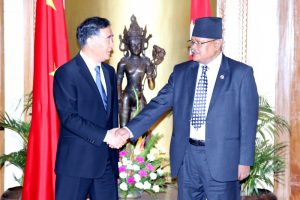
India being the biggest country in BIMSTEC must put more resources for the success of this regional group. After the advancement of technology it is easy to enhance people to people contact and the trade between member nations can enhance manifold. Vast energy resources are available with member countries while India needs lot of energy hence it can be a win-win situation for both. Thailand and Myanmar should not ignore BIMSTEC because of ASEAN and must render due importance to it.
(Jai Kumar Verma is a Delhi-based strategic analyst and a retired senior intelligence officer. The views in the article are solely the author’s. He can be contacted at editor.adu@gmail.com)






































